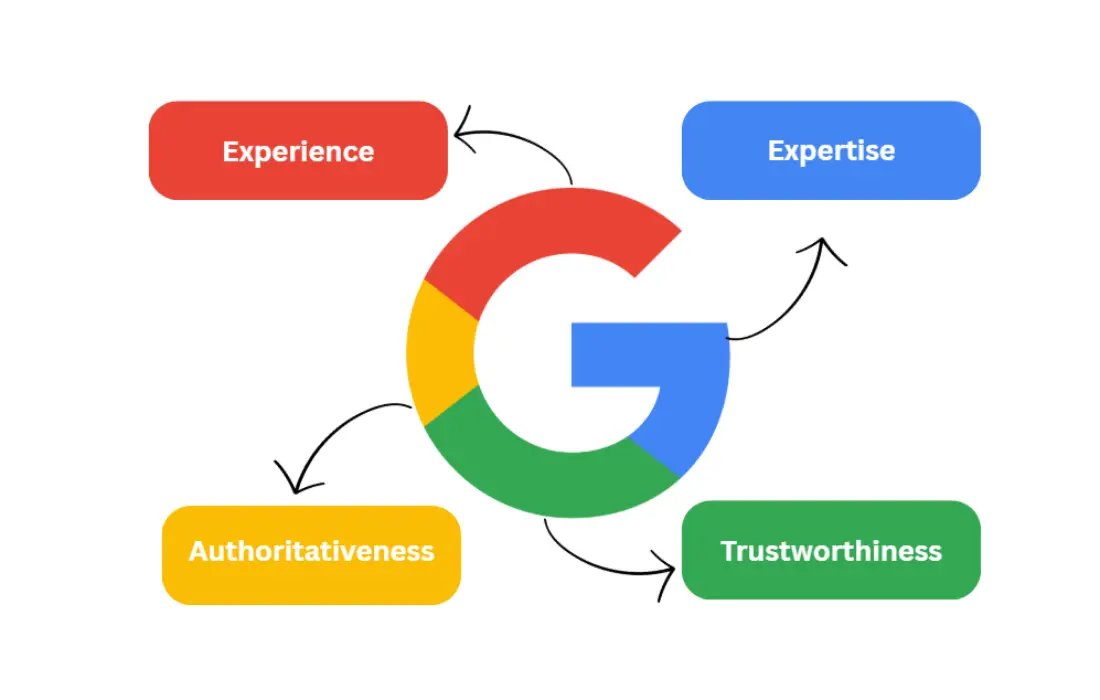
If you’ve been under the impression that E-E-A-T—Experience, Expertise, Authoritativeness, and Trustworthiness—has lost its relevance, it’s time to rethink your strategy. In 2025, E-E-A-T is more critical than ever for creating content that stands out in Google’s evolving search landscape.
While it’s not a direct ranking factor or something you can simply “add” to your website, E-E-A-T remains the backbone of high-quality content that earns trust and drives engagement. Let’s dive into why this framework is indispensable for SEO success and how you can leverage it effectively to thrive in a competitive digital world.
E-E-A-T isn’t just a buzzword, it’s Google’s way of ensuring users receive reliable, accurate, and trustworthy information—especially for topics that impact their health, finances, or safety (known as Your Money or Your Life, or YMYL topics). While it’s not algorithmically enforced for all websites, adopting E-E-A-T principles can elevate your content quality and build long-term credibility with users.
Here’s the truth: E-E-A-T isn’t something you can artificially inject into your web pages. It’s not about adding credentials to an author bio or linking to authoritative sources just for the sake of it. Instead, it’s about demonstrating genuine expertise, experience, and trustworthiness through the quality of your content and the signals your site sends to users and search engines alike. This means that instead of focusing on “ticking boxes,” your goal should be to create content that naturally reflects these qualities.
Users want content that feels real and relatable. Highlight firsthand experiences when discussing topics in your niche.
Expertise is about depth, not fluff. Show users (and search engines) that your content is backed by knowledge.
Authority isn’t built overnight—it’s earned through consistent effort and recognition within your industry.
Trust is the foundation of any successful website—without it, users won’t stick around long enough to convert.
For YMYL topics like healthcare or finance, Google places a higher emphasis on trust signals because these areas directly impact users’ well-being or financial stability. If you operate in these niches, aligning with E-E-A-T principles is non-negotiable.
For non-YMYL websites (like recipe blogs or lifestyle sites), while E-E-A-T isn’t algorithmically enforced as strictly, following its principles can still help boost user engagement and build long-term credibility.
As search evolves, so does the way Google evaluates content quality and E-E-A-T will continue to adapt alongside it. Here are some trends shaping its future:
1. AI Content with a Human Touch:
AI-generated content is here to stay, but users (and Google) will favor content enhanced by human insights and expertise over generic AI outputs.
2. Visual & Voice Search Optimization:
With visual and voice search gaining traction, integrating multimedia elements like videos, infographics, and conversational tones will become essential.
3. User Engagement Metrics as Signals:
Metrics like time on page, bounce rate, and click-through rates may play an increasing role in reflecting trustworthiness.
4. Hyper-Personalization:
Tailored content that speaks directly to user intent will dominate—but only if it adheres to transparency and trustworthiness principles.
While you can’t directly measure E-E-A-T like keyword rankings, there are ways to track its impact:
E-E-A-T isn’t about gaming the system, it’s about creating content that genuinely serves users while earning their trust over time. Whether you’re tackling YMYL topics or running a lifestyle blog, the principles of experience, expertise, authoritativeness, and trustworthiness should guide every piece of content you publish.
In 2025 and beyond, success in SEO will come down to one thing: being genuinely helpful to your audience while maintaining transparency and credibility at every step.
E-E-A-T remains critical because Google continues to prioritize content that is reliable, accurate, and genuinely helpful to users. It helps distinguish trustworthy content from low-quality or generic pages, especially in competitive and AI-driven search results.
Backlinks from reputable and relevant websites act as third-party validation of your content. They signal to Google that your site is recognized and trusted within its industry.
AI content can weaken E-E-A-T if it lacks originality, accuracy, or real experience. However, when guided by human expertise and reviewed for quality, it can still support strong E-E-A-T signals.
E-E-A-T will continue evolving as Google refines how it evaluates content quality, user trust, and real-world expertise. User engagement and credibility signals are likely to play a bigger role over time.
Transparency builds trust by clearly showing who created the content, how information is sourced, and whether AI was involved. Open disclosure reduces user doubt and increases credibility.
Yes. AI content can meet E-E-A-T standards when it is fact-checked, enriched with real experience, and reviewed by subject-matter experts. Human oversight is essential to maintain trust and accuracy.